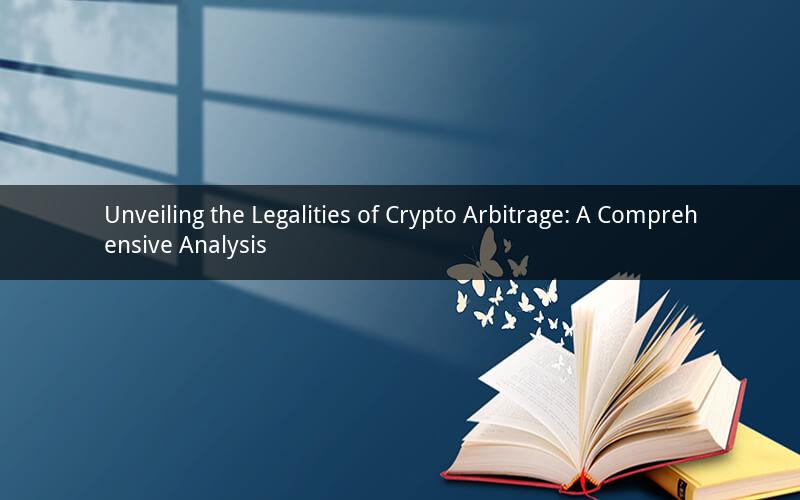
Introduction:
Crypto arbitrage, a strategy that exploits price discrepancies across different cryptocurrency exchanges, has gained significant attention in the digital currency market. However, many individuals are left wondering whether this practice is legal or not. In this article, we delve into the legal aspects of crypto arbitrage, exploring the factors that determine its legality and addressing common concerns surrounding this topic.
Is Crypto Arbitrage Illegal?
1. Understanding Crypto Arbitrage:
Crypto arbitrage involves taking advantage of price differences in the same or different cryptocurrencies across multiple exchanges. By purchasing a cryptocurrency at a lower price on one exchange and selling it at a higher price on another, individuals can earn a profit without taking on additional risks.
2. Legal Framework:
The legality of crypto arbitrage depends on various factors, including the jurisdiction in which the activity takes place and the specific regulations governing digital currencies.
a. Regulatory Landscape:
Different countries have varying approaches to regulating cryptocurrencies and related activities. While some jurisdictions have explicitly legalized crypto arbitrage, others have imposed restrictions or outright bans.
b. Compliance with Local Laws:
Individuals engaging in crypto arbitrage must ensure that their actions comply with the legal requirements of their respective countries. This includes adhering to anti-money laundering (AML) and know your customer (KYC) regulations.
3. Legality of Crypto Arbitrage:
a. Legal in Many Jurisdictions:
In many countries, crypto arbitrage is considered legal. These jurisdictions recognize it as a legitimate trading strategy that contributes to market efficiency. However, individuals must still comply with local regulations and report any taxable income derived from their activities.
b. Restrictions and Banning:
Some countries have imposed restrictions on crypto arbitrage, either through outright bans or by limiting the scope of the activity. These restrictions are often aimed at preventing market manipulation and protecting consumers.
4. Challenges and Risks:
Despite its legality in many jurisdictions, crypto arbitrage comes with its own set of challenges and risks.
a. Market Volatility:
The cryptocurrency market is highly volatile, and price discrepancies can quickly disappear. This poses a challenge for individuals attempting to exploit these differences, as they may not always find profitable opportunities.
b. Legal and Regulatory Changes:
The regulatory landscape surrounding cryptocurrencies is constantly evolving. Changes in laws and regulations can impact the legality of crypto arbitrage, making it essential for individuals to stay informed and adapt their strategies accordingly.
5. Ethical Considerations:
While crypto arbitrage is generally legal, ethical concerns may arise. Individuals engaging in this practice must ensure that their actions do not harm the market or manipulate prices unfairly. Transparency and fairness are crucial in maintaining a healthy and sustainable market environment.
Frequently Asked Questions:
1. Q: Can I engage in crypto arbitrage if I am not a resident of a country that allows it?
A: It is crucial to comply with the legal requirements of your jurisdiction. Engaging in crypto arbitrage from a country where it is illegal can lead to legal consequences, including fines and penalties.
2. Q: Are there any specific regulations I need to follow when engaging in crypto arbitrage?
A: Yes, individuals must comply with anti-money laundering (AML) and know your customer (KYC) regulations. This may involve providing identification documents, verifying the source of funds, and maintaining proper records of transactions.
3. Q: Can I be prosecuted for crypto arbitrage even if it is legal in my country?
A: Generally, individuals engaging in legal crypto arbitrage are not subject to prosecution. However, if there is evidence of market manipulation or fraudulent activities, legal consequences may arise.
4. Q: Is crypto arbitrage the same as market manipulation?
A: No, crypto arbitrage is a legitimate trading strategy aimed at capitalizing on price differences. Market manipulation involves intentionally distorting prices for personal gain, which is illegal in most jurisdictions.
5. Q: How can I stay informed about the legalities of crypto arbitrage?
A: It is essential to stay updated on the regulatory landscape surrounding cryptocurrencies. Following reputable news sources, legal experts, and regulatory authorities can help individuals stay informed about any changes in laws and regulations.
Conclusion:
Crypto arbitrage, while legal in many jurisdictions, requires individuals to comply with local regulations and ethical considerations. By understanding the legal framework, individuals can engage in crypto arbitrage responsibly and maximize their profits while minimizing risks. Staying informed about the evolving regulatory landscape is crucial to ensure compliance and avoid legal consequences.